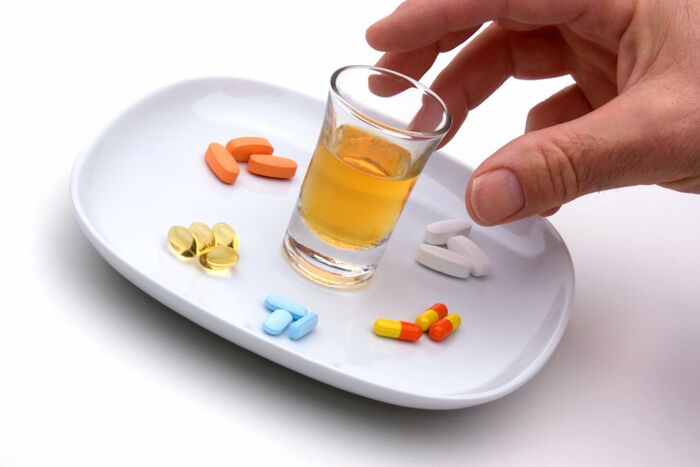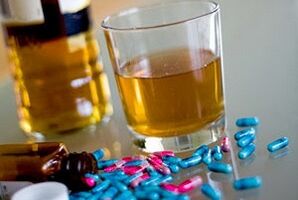Antibiotics, despite their long list of contraindications and a wide range of side effects, are a much-needed drug that has saved more than one life. Because only antibiotics can destroy bacteria in the body that cause dangerous illnesses.

In the days before these drugs were invented, many people died from bacterial infections. Many diseases were considered incurable due to the lack of such medications.
Antibiotics cannot be taken without a prescription and it is very important to follow the rules for taking them. Also, you need to know that antibiotics are incompatible with alcohol. Answers to all questions related to antibiotic use are contained in this article.
Antibiotic Rules
The most important rule of thumb for taking antibiotics is to use them only in cases where it is impossible to do without them. Indications for use are symptoms of an acute bacterial infection, which the body cannot deal with on its own. To obtain the desired therapeutic effect, the use of antibiotics cannot be indiscriminate.
It is essential that you follow the instructions below:
Before prescribing an antibiotic, it is imperative to inform the doctor about the following:
- drugs currently being taken;
- pregnancy or lactation;
- kidney or liver disease;
- diabetes.
And also if noted above:
- the occurrence of side effects;
- the development of allergic reactions;
- recent use of antimicrobial agents.
When can I drink alcohol after finishing my course of antibiotics?
Different antibiotics have different active ingredients. And, consequently, each drug has its own terms of elimination from the body. In one case, it is a short period and alcohol can be taken the next day, and in the other, abstinence from alcohol is required for 7 days.
The necessary information is, as a rule, indicated by the manufacturer in the preparation note. If you are away, it is preferable to wait 10 days. Also, if the patient has kidney or liver problems, this period should be at least doubled.
How long after alcohol can you drink antibiotics?
Alcohol is completely eliminated from the body 21 hours after the last ingestion. After that time, you can take the prescribed antibiotics. However, in any case, it is better to reduce your alcohol consumption as much as possible if you are taking a course.
Reasons for incompatibility of alcohol and antibiotics
In addition to the fact that taking antibiotics significantly overloads the kidneys and liver, and taking them along with alcohol only makes the situation worse because ethanol slows down the work of the excretory systems, there is another important reason for the incompatibility.
All substances that enter the human body begin to disintegrate until only the original parts remain. This also happens with alcohol and antibiotics. The danger of co-administration is that antibiotic molecules are similar to alcohol molecules. The body cannot recognize correctly, which leads to failure.
Alcohol is perceived by the body as a drug, which leads to the fact that alcohol molecules are incorrectly processed by the body.
Consequences of not following antibiotic use rules
In case of violation of the rules for taking antibiotics, as well as the wrong choice of a drug or an incorrectly prescribed treatment regimen, unwanted side effects often occur.
These include:
Only a serious attitude towards the use of antibiotics will produce the necessary therapeutic effect.
What antibiotics are strictly prohibited from taking with alcoholic beverages?
There are antibiotics that are strictly prohibited to be consumed at the same time as drinks that contain alcohol. This information, without fail, is indicated in the medication note, in addition, the physician responsible for prescribing the antibiotic must alert the patient about it.
These medications include the following antibiotics:
- Tetracycline group. Preparations based on them are often used in medicine, they have a wide spectrum of action;
- Chloramphenicol group. This group of drugs often causes side effects and, in combination with alcohol, can increase the drug's toxic effect;
- Lincosamide group. When taken simultaneously with alcoholic beverages, it has a negative effect on the liver and central nervous system;
- Group of aminoglycosides. This group of drugs is one of the strongest among antibiotics. Bad compatibility with other medications, not to mention alcohol
- The cephalosporin group. The joint ingestion of alcohol causes symptoms of severe intoxication in the body, which leads to a strong deterioration in well-being;
- Macrolide Group. The combination of alcohol and an antibiotic results in a strong toxic effect on the liver and brain;
- Antibiotics used to treat tuberculosis;
- Antibiotics used to treat leprosy.

There are also medications in the pharmacological market for which the annotation does not contain information about the interaction with alcohol.
The lack of information about the combination with alcohol does not in any way imply that the combination is permissible. There is no need to expose the body to unnecessary risk.
Possible consequences of combining an antibiotic and alcohol
There is no way to know in advance how a particular organism will react to the simultaneous ingestion of fluids containing alcohol and antibiotics. Damage can be done to any area of the body.
However, there are the most common consequences:
- Severe allergic reactions;
- Strong and unbearable headache;
- Dizziness;
- difficulty breathing
- Chest pain, pressing character;
- A sharp rise or fall in blood pressure;
- Clouding of the mind;
- Excessive sweating;
- Nausea or vomiting;
- Liver damage;
- Aggravated states of intoxication and hangover;
- The need to repeat the course of antibiotics. Alcohol reduces or destroys the drug's effect.
The consequences can be even sadder, it all depends on the individual and their health. The negative consequences are always the suffering of the organism, in whole or in part. The negative effects can easily be avoided simply by eliminating alcohol along with antibiotics.
It is important to know that currently, through clinical studies, only part of all antibiotics have been proven incompatible with alcohol. The rest of the medications remain in doubt or are not fully understood.
The person himself must understand the emergence of possible consequences, focusing on medications with incompatibility with ethanol already studied. Responsibility for your health should be a priority over any life circumstances associated with alcohol consumption.
And to get the best result from the treatment, it is necessary to give up alcohol, any alcohol, even the weakest one.
























